When we think of American wine, our minds usually conjure up images of those classic Napa Valley wineries that have dominated the country’s viticulture scene for decades. Which is why you’ll probably be surprised to learn that the wine industry didn’t get started in California, nor even in the state of Washington, the nation’s second biggest producer of wines. It really started in Virginia.
Having failed to produce any decent wines using native grapes, the first British colonists in Jamestown set about importing European varieties, even passing a law requiring all men to plant a minimum of 20 grapevines each. These early attempts at cultivating European grapes also failed, and it wasn’t until landowners like Thomas Jefferson got involved with their deep pockets and plentiful connections in Europe that the first “proper” Virginian wines began appearing in the late 1700s, before other regions proved better suited.
The persistence of these first winemakers has certainly paid dividends, with Virginia’s wines now ranking up there with some of the best in the United States. Now boasting over 300 wineries, regions like the Old Dominion’s Charlottesville grape growing area, for example, are producing award-winning vintages and varietals. High praise indeed, and something of which Jefferson himself would no doubt be proud. Find out more about some of the South’s best winemakers with our list of the best wine country towns in Virginia.
Charlottesville
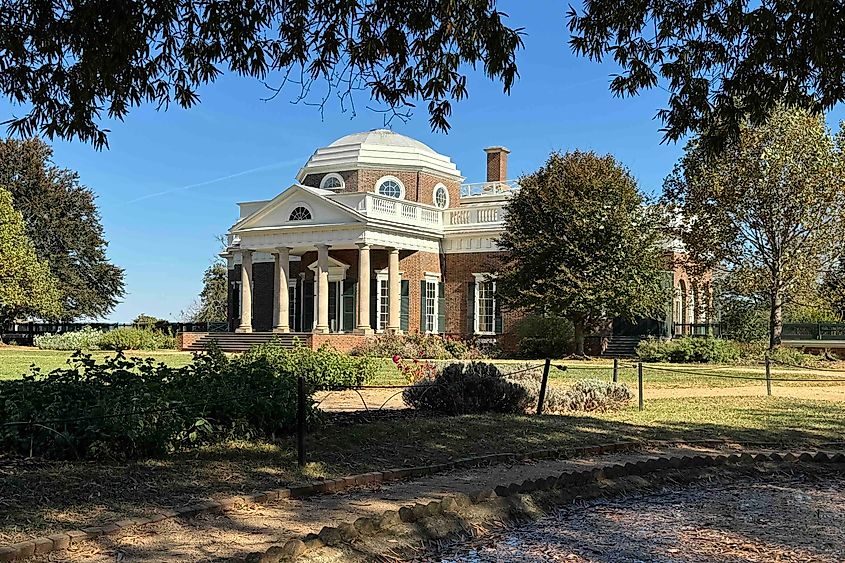 Monticello was where Thomas Jefferson dabbled in winemaking. Image credit: Bryan Dearsley
Monticello was where Thomas Jefferson dabbled in winemaking. Image credit: Bryan Dearsley
The Monticello Wine Trail is named after the third President’s famous estate in a nod to the efforts of Thomas Jefferson and the early Virginian wine-growers. It’s also one of the best ways to get to know Charlottesville’s wine heritage. A fun-to-drive circuit that includes over 40 wineries producing some of Virginia’s best vintages, you’ll get to visit such iconic properties as Barboursville Vineyards. Established in 1976 on the grounds of the former estate of Jefferson’s friend and neighbor, Governor James Barbour, you can still see the ruins of the 1822 Jefferson-designed mansion. Several tour options are available, including some combined with picnics, food pairings at the Palladio Restaurant, and even overnight stays in the property’s 1804 Inn and Cottages.
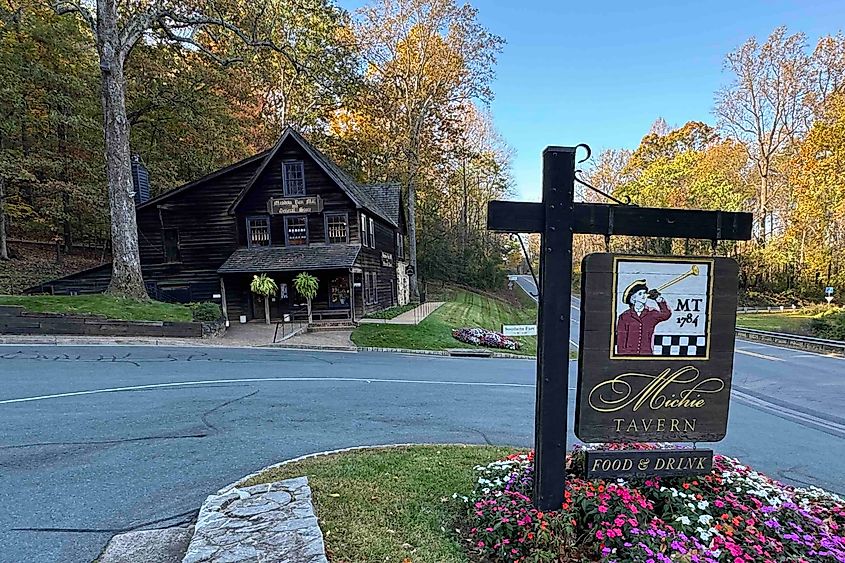 Charlottesville’s Michie Tavern sells its own unique Virginia wines from its General Store. Image credit: Bryan Dearsley
Charlottesville’s Michie Tavern sells its own unique Virginia wines from its General Store. Image credit: Bryan Dearsley
Charlottesville’s deep connection to Thomas Jefferson and his love for wine has also rubbed off on local eateries like Michie Tavern. Just a stone’s throw from Monticello, the tavern was built in 1784 and moved piece by piece to its current location in 1927. Re-opened as a restaurant serving traditional 18th-century dishes popular in Jefferson’s time, they often serve their own locally produced wines, created in the French-style favored by Jefferson. Named the Michie Tavern Finest Red, you can even buy some to take home with you from the adjacent Meadow Run Mill & General Store.
Other wine-related experiences in and around Charlottesville include King Family Vineyards, popular not just for weddings but also for polo matches at its Roseland Polo Club. It also hosts a popular summer concert series in its Roseland Pavilion. Monticello Wine Week also offers up the chance to partake in special event-related tours and tastings along the wine trail.
Williamsburg
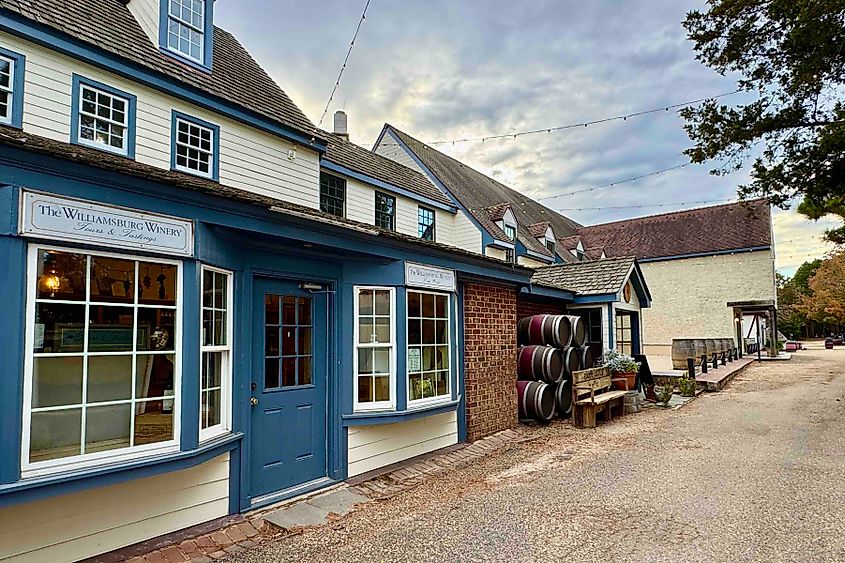 You’ll feel like you’re in Europe as you explore Williamsburg Winery. Image credit: Bryan Dearsley
You’ll feel like you’re in Europe as you explore Williamsburg Winery. Image credit: Bryan Dearsley
A community involved in early attempts at growing European grapes on American soil, Williamsburg has also made a name for itself as one of Virginia’s best wine country towns. The star of the show here is Williamsburg Winery, a 400-acre estate set on land that was once used in the region’s early grape growing efforts of the 1600s. Founded in 1985, its Belgian backers recognized the similarities between the climate of this part of Virginia and that of Bordeaux, one of France’s premier wine regions. Now a major tourist attraction, it’s a must-visit whether you’re a wine enthusiast, a foodie, or just looking for a cool place to stay in Williamsburg. Their Gabriel Archer Tavern is equally wonderful and serves lunch and dinner with entrées like hanger steak served in a delicious red wine sauce. I visited in late October and heartily recommend the garden-like ambience of their patio.
 Merchants Square in Colonial Williamsburg is where you’ll find the Williamsburg Winery Wine Bar. Image credit: Bryan Dearsley
Merchants Square in Colonial Williamsburg is where you’ll find the Williamsburg Winery Wine Bar. Image credit: Bryan Dearsley
For a light bite and a drink, the property’s Godspeed Galley Bar is a great choice. In either case, you’re only a few steps away from the vineyard’s bottle shop and tasting venue. For a truly memorable experience, check into the winery’s boutique-style Wedmore Place hotel. Reminiscent of a classy French chateau, it features just 28 rooms and includes first-rate breakfasts and, of course, wine tastings. If you can’t make it out to the winery and are visiting nearby Colonial Williamsburg, pop into the Wine Bar on Merchants Square to indulge in a sip or two (or three) of Williamsburg Winery’s best vintages.
Middleburg
 Main Street in Middleburg. Virginia. Editorial credit: Kosoff / Shutterstock.com.
Main Street in Middleburg. Virginia. Editorial credit: Kosoff / Shutterstock.com.
Known for fox hunting, the attractive town of Middleburg has now also made a name for itself in winemaking. Here, the mix of loamy and clay soil is enhanced by a microclimate with substantially fewer frost days than other areas. This extended growing season has been especially good for local Cabernet Sauvignon and Petit Verdot grapes, a fact that’s recognized by the Middleburg AVA (American Viticultural Area), which ensures authentic regional character in bottles bearing the designation.
Leading winemakers in Middleburg include Boxwood Estate Winery with its Bordeaux-style varietals and first-rate tasting room. Meanwhile, Chrysalis Vineyards is a pioneer and champion of Virginia’s native Norton grape, particularly with its signature Locksley Reserve Norton, and Greenhill Vineyards prioritizes sustainable farming and produces high-quality reds, whites, and rosés. While in town, be sure to check out the famous Red Fox Inn & Tavern for a meal or a stay in one of the tastefully decorated rooms, suites, and cottages. The jewel of Virginia’s Hunt Country has been in operation since 1728 and supports local wineries with its wine-pairing dinners.
Cape Charles
 Aerial view of Cape Charles, Virginia.
Aerial view of Cape Charles, Virginia.
Located on Virginia’s magnificent Eastern Shore between the Atlantic and Chesapeake Bay, Cape Charles is Virginia’s only coastal AVA. Here, the maritime influence from the Bay creates unique growing conditions, with the region’s sandy loam soils, morning fog, and consistent wind speeds leading to reduced frosts and a longer grape growing season.
The star of the Cape Charles wine scene is Chatham Vineyards & Winery, highly regarded for its Church Creek Steel Chardonnay, the perfect match for delicious local oysters and Chesapeake blue crab. In fact, you can combine both at unique experiences like the winery’s Wine & Brine oyster and wine pairing offerings. Cape Charles businesses also celebrate the town’s wine scene, including Ambrogia Caffé & Enoteca, which runs a members-only wine club that sometimes features local vintages.
Floyd
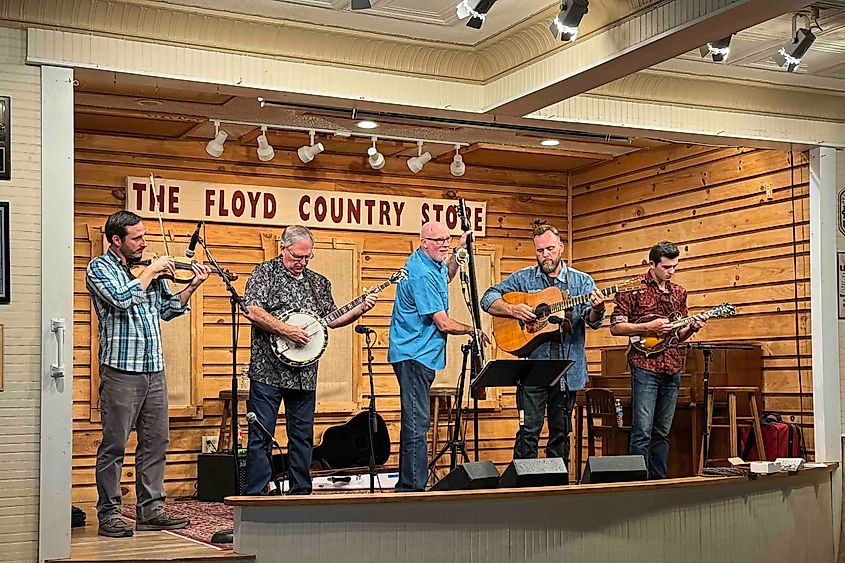 The famous Friday Night Jamboree is another great reason to visit Floyd. Image Credit Bryan Dearsley
The famous Friday Night Jamboree is another great reason to visit Floyd. Image Credit Bryan Dearsley
Virginia’s highest wine region, Floyd, long known for its folk music, is home to Chateau Morrisette Winery. Established in 1978 and one of Virginia’s oldest wineries, the sprawling estate offers tours as well as pairings at its excellent on-site restaurant. In addition to its authentic Southern cuisine, you can check out specialties like elk tenderloin paired with their Black Dog red blend. Also noteworthy is the Tuscan-style Villa Appalaccia Winery, which grows Italian varietals and hosts regular music performances. Make a weekend of it at Hotel Floyd and check out the famous Friday Night Jamboree at Floyd Country Store just down the road.
Leesburg
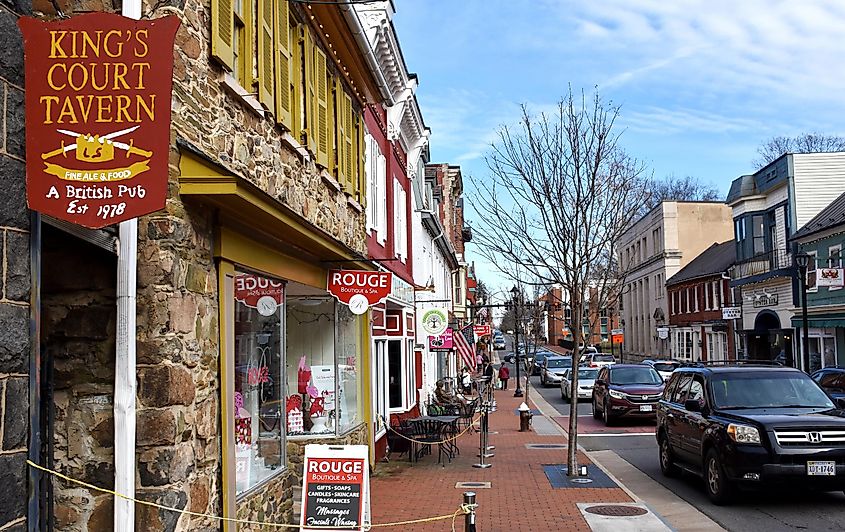 Street and shops in Leesburg, Virginia.
Street and shops in Leesburg, Virginia.
The closest of Virginia’s grape growing regions to Washington D.C., Leesburg and its surrounding countryside are home to over 50 wineries, making it the unofficial capital of D.C.’s Wine Country. The town’s historic downtown features numerous tasting rooms and wine bars within easy walking distance, a perfect option for those not wanting to drive after imbibing. If you do choose to visit a winery, you couldn’t do much better than making it the family-owned Stone Tower Winery, set on over 300 acres of rolling countryside, or Fabbioli Cellars with its more unusual grape varietals and outdoor seating for tastings and small bites. A popular place to stay for wine lovers is The Lansdowne Resort, which offers wine country packages, as well as spa services and golf.
Afton
 Veritas Vineyard and Winery (Credit: Justin Hollinger via Shutterstock)
Veritas Vineyard and Winery (Credit: Justin Hollinger via Shutterstock)
Located along the Blue Ridge Parkway, Afton is a great destination for Virginia wine lovers. If that sounds like you, hit the Nelson 151 Craft Beverage Trail, which takes in not only some of the area’s best wineries, but also cideries, breweries, and distilleries. The small, bespoke Cardinal Point Vineyard & Winery is a great stop and offers fun tastings, as well as unique accommodations in a restored farmhouse with unimpeded mountain views. Veritas Vineyard and Winery is another very safe bet. In addition to tours and wine tasting, they offer four-day retreats as well as fine dining in their Farmhouse at Veritas.
Virginia’s modern wine country is a testament to centuries of persistence, passion, and experimentation. From Jamestown’s earliest struggles to today’s flourishing AVAs, the state has transformed into a dynamic destination for wine lovers. Whether you’re drawn to historic estates, coastal vineyards, or mountain-backed tasting rooms, each town offers its own distinct flavor of Virginia’s winemaking story. Explore them all, and you’ll discover why the Old Dominion’s vintages continue to earn national acclaim.

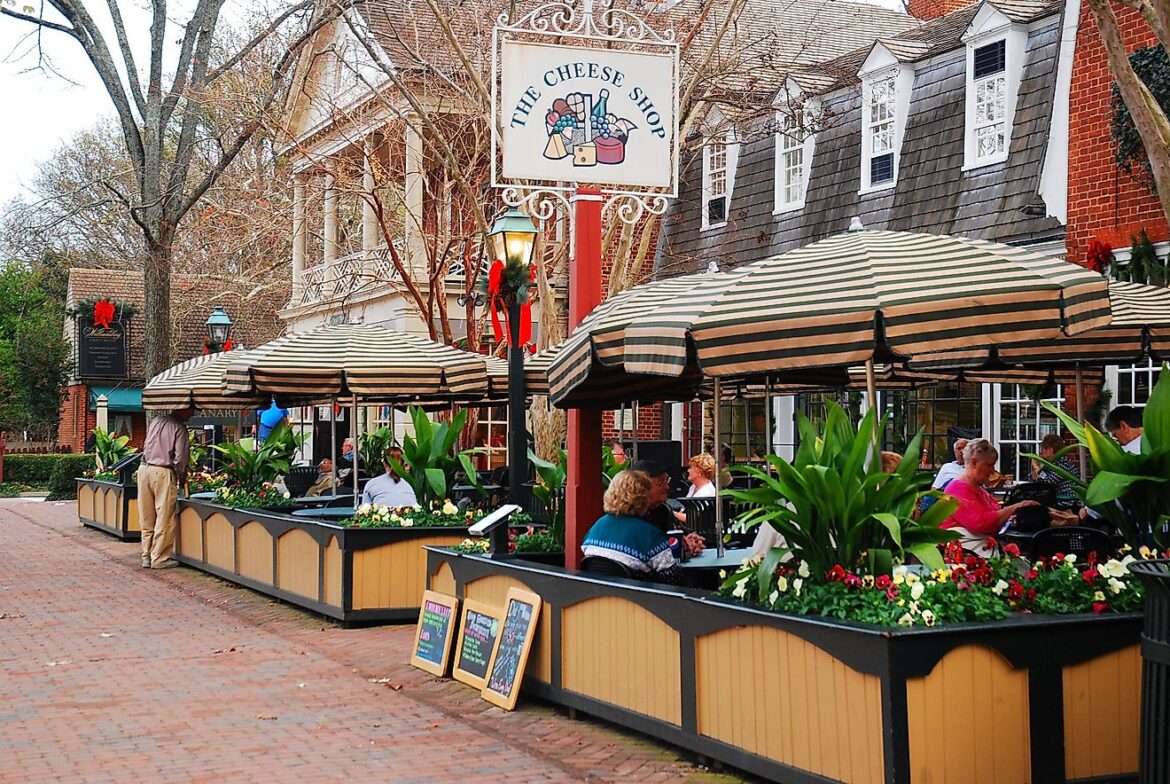
Dining and Cooking